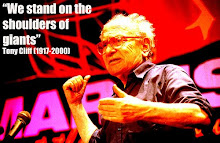Posted item #4 'Nothing so romantic'
This classic interview from 1970 provides insight into the times as well as some illuminating examples of Cliff's political positions and preoccupations. He stresses 'the statement that the emancipation of the working class is the act of the working class'. This distinguished the IS tradition from not only reformism but also Stalinism and its variants - Maoism was still fashionable on the left at the time, while many revolutionaries romanticised Third World struggles at the same time as despairing of Western working classes.
Cliff repeatedly insisted there can be no substitutes for mass working class struggle, no convenient shortcuts. This helped distinguish IS in late 60s and early 70s - from Labour and the Communist Party, yes, but also from many who considered themselves revolutionaries.
He acknowledges that IS at the time didn't yet have a strong enough base in the manual working class - admirable honesty (typical of Cliff), especially as he was addressing a largely non-IS audience. The high student representation in IS was mainly a symptom of the organisation's highly successful work in the universities in 1967-68.
Over the next few years - a period of upturn in working class struggle - IS did indeed orient sharply on building amongst (and recruiting) workers. By 1974 membership was 3-4000, up from 1000 at the end of 1968, and Socialist Worker was a 16-page weekly with a circulation that stretched far beyond the membership of IS. The paper, together with great energy being devoted to rank and file initiatives in industry, enabled the organisation to implant serious roots in the organised working class.
Subscribe to:
Post Comments (Atom)

No comments:
Post a Comment